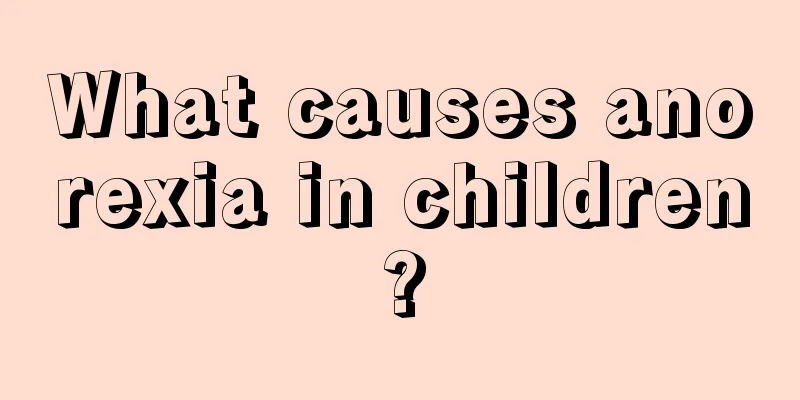What causes anorexia in children?

|
Some children always need to be chased and urged by their family members to feed them when they are eating, but they are still unwilling to eat more than a few bites; some children may be having fun, but when it is time to eat, they will look sad and unwilling to eat. Such children are often much thinner than their peers and do not develop well. This is because such children suffer from anorexia and their bodies are not getting the nutrition they need. So, what causes anorexia in children? 1. Children have certain gastrointestinal diseases: If the child has peptic ulcer, acute and chronic hepatitis, chronic enteritis, diarrhea due to various reasons, and chronic constipation, etc., they may cause anorexia in children, and the original disease should be specifically identified. 2. Side effects of drugs: Certain drugs can cause allergic reactions in children's digestive tract, causing nausea, vomiting, anorexia, etc. Common drugs include erythromycin, chloramphenicol, sulfonamides and aminophylline. Vitamin A or vitamin D poisoning can also cause anorexia, and some anti-cancer drugs are more likely to cause anorexia. 3. Lack of certain trace elements and endocrine hormones: This is also a major cause of anorexia. For example, zinc deficiency often causes anorexia, and certain endocrine hormones, such as hypothyroidism and relative deficiency of adrenal cortex hormones, can also cause anorexia. 4. Parents feed their children improperly. As family economic conditions improve and the supply of children's snacks in the market increases, children are easily tempted to eat snacks. High-protein and high-sugar diets reduce appetite. Eating candies, desserts, peanuts, melon seeds and other snacks between meals, as well as eating at irregular times and living irregularly, all affect appetite. 5. Acute mental stimulation. For example, if a child is severely frightened, he or she will become listless, his or her activities will be inhibited, and his or her appetite will decrease. This kind of anorexia usually does not last long, and the appetite will return once the intimidation wears off. There are many reasons for anorexia, including the child's own reasons and the parents' reasons. If it is the parents' fault, it should be corrected in time and the child's anorexia should be gradually corrected. If the problem is caused by the child's gastrointestinal problems, the child should be treated promptly. Because when a child suffers from anorexia, it will lead to severe malnutrition. |
<<: At what age do children start to change their teeth?
>>: What happens if there is blood on the toilet paper after the child defecates?
Recommend
What should children eat to cure their cough in summer?
Children often have cold symptoms in summer. Coug...
What to do if your 8-year-old child wets the bed
Generally speaking, it is not normal for an eight...
What to do if your baby sneezes and coughs
After the baby is born, the most important issue ...
Why does my child's nose always bleed?
Some children often have nose bleeding during the...
How to guide premature infant feeding
We must pay attention to the feeding of premature...
What to do if a child has a fever in winter
Children have limited resistance, and it is easy ...
The harm of sudden lack of urine in babies
Many parents find that their babies suddenly urin...
What should five-month-old babies eat to supplement zinc?
Generally speaking, five-month-old babies lack zi...
How to cure baby’s mouth ulcers quickly?
Parents are very concerned about their baby's...
What should I do if my child has a cold and a fever of 38.2 degrees?
Many children suffering from fever make many pare...
Why does my child's feet hurt?
If children often have sore feet, parents must pa...
Newborn baby white blood cell count
If the white blood cell count of a child is found...
What to do if your three-month-old baby refuses to eat milk powder
Every child is fed with breast milk from birth, a...
Blackening of the roots of children's teeth
The blackening of the roots of children's tee...
Prevention of children's diseases in autumn
In autumn, the temperature difference between day...









